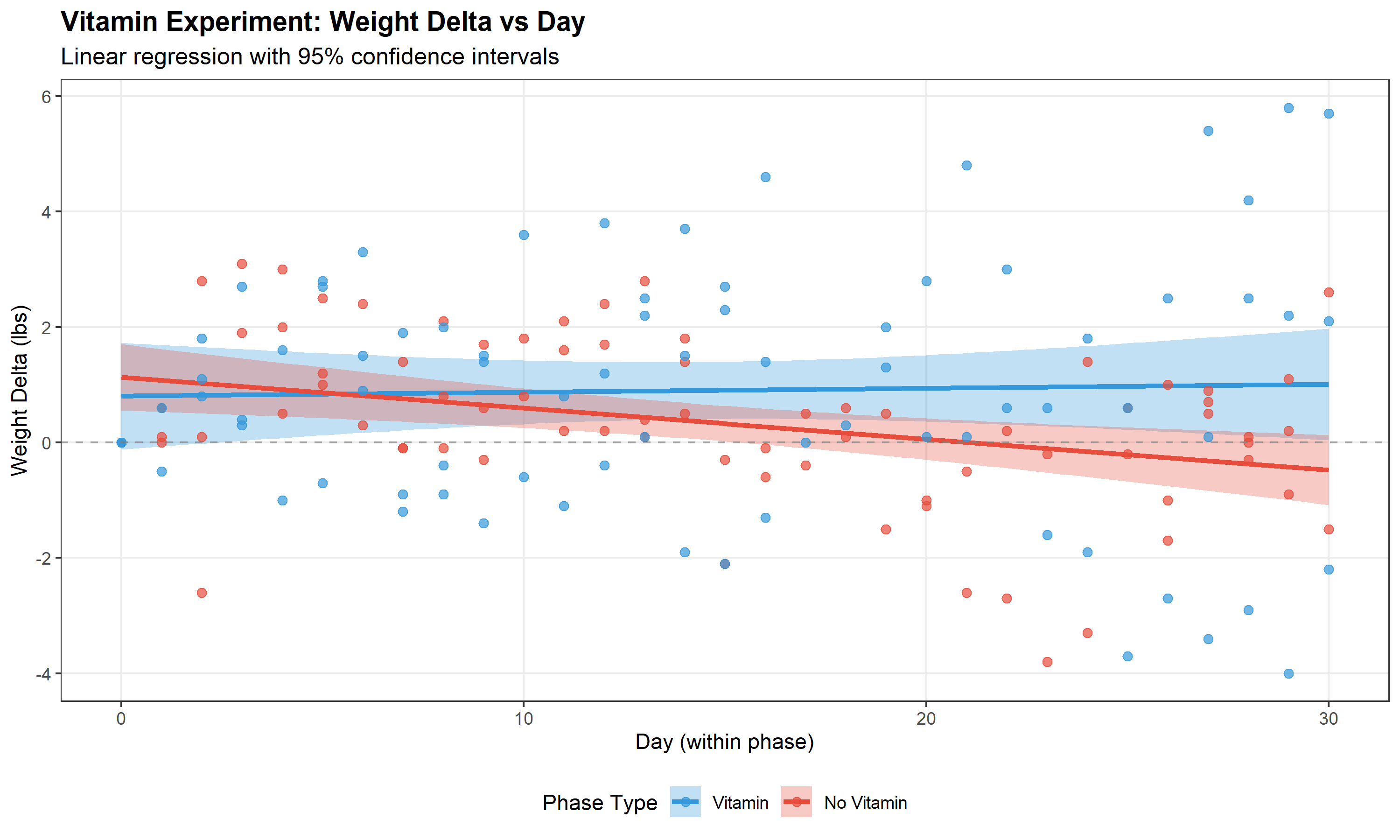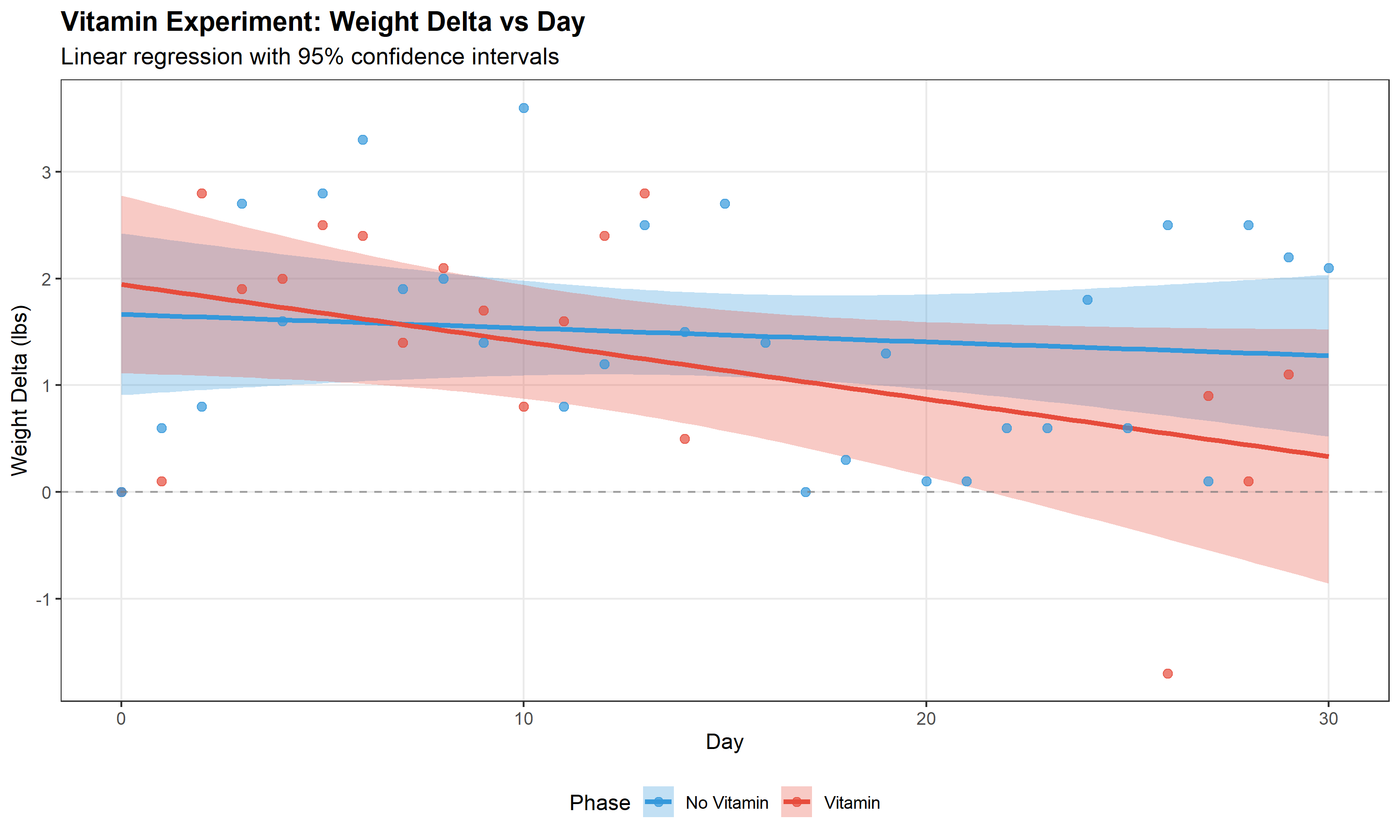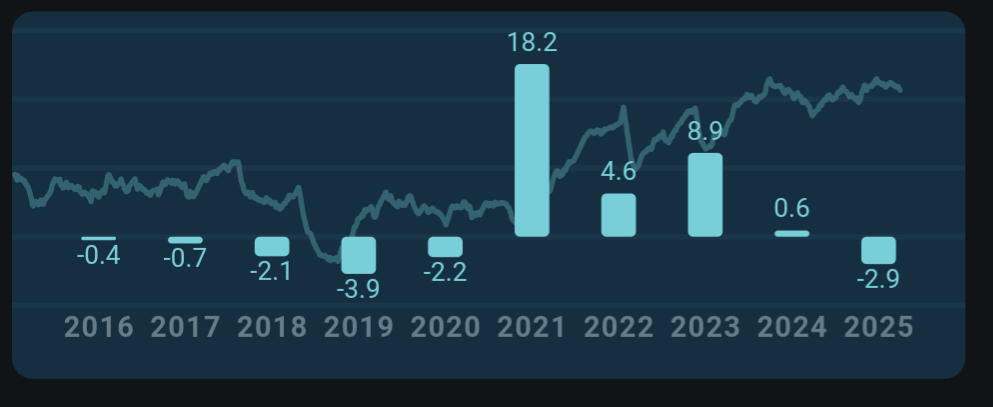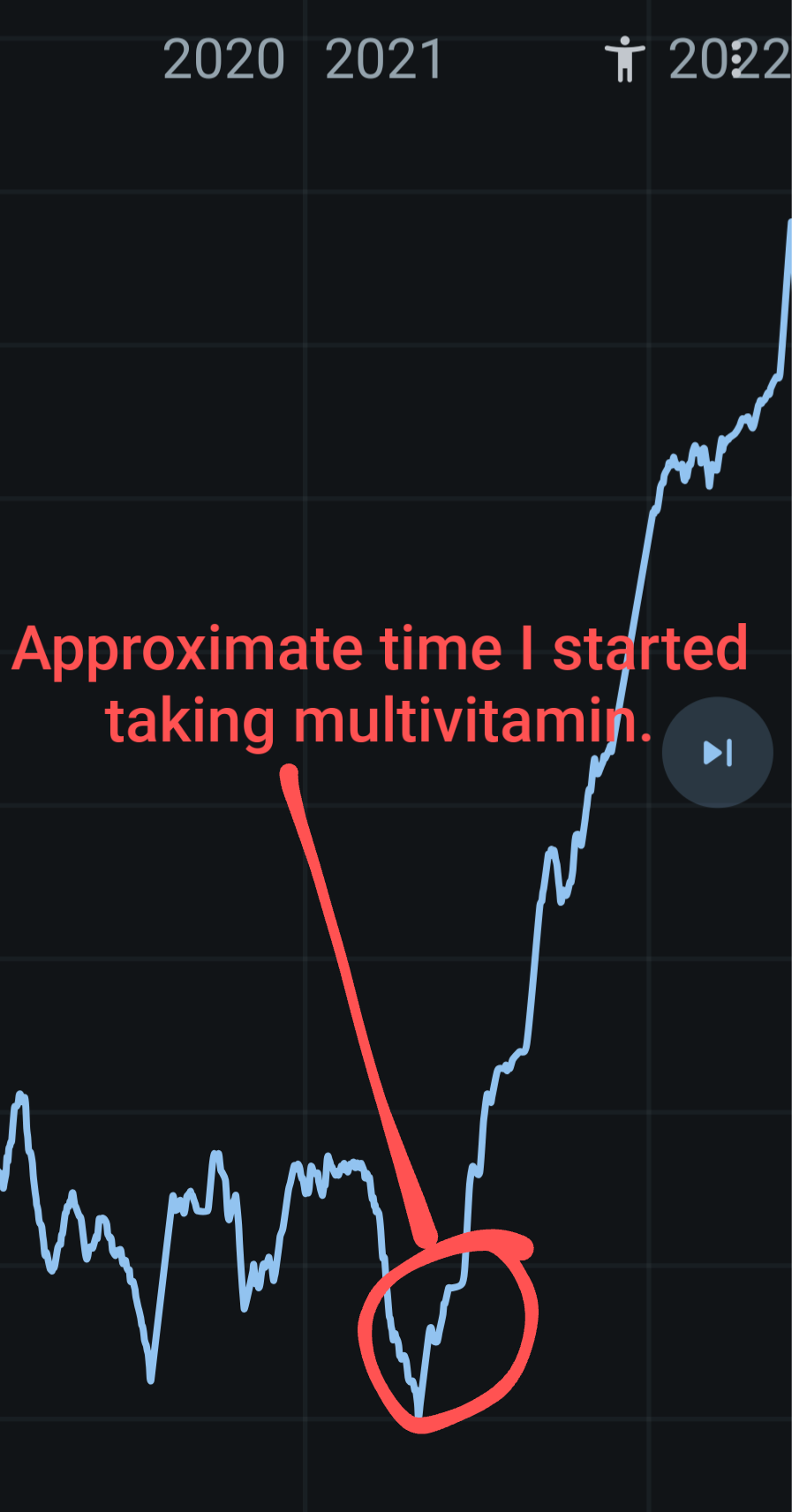I'm conducting an N=1 self-experiment, starting today, to try to gain evidence for or against the idea that taking a multivitamin causes me to gain weight. The experiment will run for about 6 months and will alternate between 30 day phases where I take a multivitamin and where I'm not taking the vitamin. For each phase, I will record my weight on the morning starting the phase, and then record the delta from that first point for each subsequent day.
To determine how to resolve this market, I will use R to fit linear models to both the three vitamin taking phases and the three non vitamin taking phases. I will use R to compute the 95% confidence interval for the coefficient on the day variable. If the lower bound of the vitamin confidence interval is greater than the upper bound of the non-vitamin confidence interval and greater than zero, then I will resolve this market as YES. Otherwise, it will resolve as NO.
The multivitamin I'm taking contains the following:
Vitamin A: 180mcg
Vitamin D: 50mcg
Vitamin E: 6.7mg
Folate: 200mcg
Vitamin B12: 8mcg
Magnesium: 30mg
Zinc: 2.4mg
Omega-3 DHA: 333mg
Boron: 0.7mg
Vitamin K2: 90mcg
The experiment should run for about six months. I have some travel planned during that time. I'm not planning on packing a scale when I go, so I will not record weights during travel and for two days afterwards. If I travel during a vitamin phase, I will keep taking the vitamin during the trip. If a phase ends during a trip, I will just count the data collected before the trip started, and I will delay the start of the next phase until two days after the trip ends. I've set the end date for this market based on the schedule if I don't have to delay any phase starts. If I do delay a phase start, I'll adjust the end date accordingly.
While I'm attempting to make this as scientific as possible, N=1 studies are inherently limited. Obviously the experiment is not blinded, and I have a pretty strong prior that the multivitamin does cause weight gain, so the setup is prone to see weight gain during the vitamin phases caused by a placebo effect.
Today (2025-04-25) I started a vitamin phase, and in 30 days I'll end that phase and begin a non-vitamin phase. I previously was taking this multivitamin for a couple years, but I tapered off and stopped taking them during the second half of last year. Until this morning, I had not taken the multivitamin this year.
Update 2025-04-30 (PST) (AI summary of creator comment): The creator has updated the resolution criteria slightly. The market will now resolve YES only if both of the following conditions are met:
The lower bound of the 95% confidence interval for the daily weight change coefficient during the vitamin-taking phases is greater than the upper bound of the 95% confidence interval for the daily weight change coefficient during the non-vitamin-taking phases.
The lower bound of the 95% confidence interval for the daily weight change coefficient during the vitamin-taking phases is also greater than zero.
Otherwise, the market will resolve NO. This change ensures that the market resolves YES only if there is statistical evidence of actual weight gain (a positive trend) during the vitamin phases, rather than just a slowing of weight loss compared to non-vitamin phases.
Update 2025-11-19 (PST) (AI summary of creator comment): Final measurement will be Friday, followed by data analysis and market resolution on Saturday morning (after trading closes).
Month-by-month weight deltas:
Month 1 (Vitamins): +2.6 pounds
Month 2 (No Vitamins): +2.1 pounds
Month 3 (Vitamins): -1.5 pounds
Month 4 (No Vitamins): -2.2 pounds
Month 5 (Vitamins): +0.2 pounds
Month 6 (No Vitamins; in progress): +4.2 pounds
🏅 Top traders
| # | Trader | Total profit |
|---|---|---|
| 1 | Ṁ78 | |
| 2 | Ṁ56 | |
| 3 | Ṁ55 | |
| 4 | Ṁ41 | |
| 5 | Ṁ31 |
Okay, I've done my data analysis and am resolving the market as NO.
Here's a graph showing the data points and the model fit to them.

The model found the following 95% confidence intervals for the slopes:
- Vitamins: [ -0.087 , -0.0201 ]
- No Vitamins: [ -0.047 , 0.0604 ]
My criteria for resolving as yes was that the No Vitamin interval did not contain zero, and that the No Vitamin interval was strictly greater than 0.
Both of these criteria were not met, so by the terms of my experiment, I did not find evidence that taking a multivitamin causes me to gain weight.
I am hoping to get a more detailed report posted on my blog either later today or sometime tomorrow. In the meantime, you can see my raw data and analysis script at https://gist.github.com/eholk/6409249567714a7e292310ca8f983d2b. That should be enough to reproduce the same conclusion.
Let me know if you have any questions! Thanks to everyone who bet on this market, and for the comments along the way.
Sorry to keep having to push this back. My last measurement will be Friday and then I'll be able to do all the data analysis, share my findings, and resolve the market. Trading is open until Saturday morning, so I won't share the final analysis or resolve the market until then.
I meant to give more data updates as the experiment progressed, but I've been lax on that. I'll share the month-by-month deltas though, in case anyone wants to update their bets with some more information.
Month 1 (Vitamins): +2.6 pounds
Month 2 (No Vitamins): +2.1 pounds
Month 3 (Vitamins): -1.5 pounds
Month 4 (No Vitamins): -2.2 pounds
Month 5 (Vitamins): +0.2 pounds
Month 6 (No Vitamins; progress so far): +4.2 pounds
@EstMtz I did change jobs, but it was from one work-from-home software engineering job to another, so I wouldn't expect as big of a change. Covid was definitely still a thing then, but things were significantly more opened up; if it was Covid-related, I would have expected it to start in 2020.
@EstMtz It's possible! I don't remember any medication changes then. It could be that my job was more stressful than I realized. It's possible having a job start as in person and transition to remote is different than being fully remote. Or maybe the Covid response was delayed, like maybe I did the first year on adrenaline or whatever and then that ran out and the pandemic effects caught up with me?
It's been a while since I've done an update. I'm well into my third and final vitamin phase, then I have one more no-vitamin phase and then I can crunch all the numbers and resolve this one way or the other. I meant to do a Phase 2 update, like I did after my Phase 1 update, but I just haven't had the chance to do it yet. I will at least say that the data since my Phase 1 update doesn't look fundamentally different from the Phase 1 data.
I wanted to give a progress update since I've finished the first vitamin and non-vitamin phases. Here's a plot of the data so far:

Both 95% confidence intervals include 0, and they overlap, so I'd interpret that to mean there's no significant difference between the phases detected so far. If I were resolving the market just based off of these data, I would resolve NO.
The first no-vitamin phase actually finished shortly before I went on vacation, so I chose to delay starting the next vitamin phase so we wouldn't miss half of the entries due to travel. So, I'm planning to start the second vitamin phase on Thursday.
Anyway, feel free to update your predictions based on the data so far!
I made a slight change to my resolution criteria. I added the clause "and greater than zero," talking about the lower bound of the confidence interval for the coefficient during the vitamin taking phases.
Previously, I only talked about it relative to the non-vitamin phases, which meant there was a possibility that I could lose weight both taking the vitamins or not, but lost weight more slowly while taking vitamins, and therefore would have resolved this saying that the vitamins cause weight gain, rather than just slowed weight loss.
If anyone feels strongly that this change invalidates the experiment and market, I can go back to the original criteria.
I wanted to give some more data to explain my prior that I mentioned in the description. I've used a smart scale to track my weight since early 2016, which means there are a lot of trends I can see. Here's a summary of my change in weight over time:

It's pretty obvious that something significant happened in 2021. For most of the years on record my weight has been pretty flat, with maybe a small downward trend. In 2021, I gained almost 20 pounds, and gained a significant amount the two years afterwards. In 2022, I did the Slime Mold Time Mold potato experiment and lost 16 pounds during that time; so if we were to add that back into the 2022 change, that would be close to 20 pounds gained then too.
In 2024, I came across some blog posts mentioning that their might be a link between vitamin fortification and obesity. I looked at my order history in my email and realized I had started taking a multivitamin in 2021, and on closer inspection I noticed the date I had started taking the supplement corresponded very closely to when I started gaining weight. See the annotated screen shot below:

Based on this, I decided to stop taking the multivitamin and see what changes happened. While I didn't see prodigious weight loss, it's been long enough since I've stopped to see that the gain has mostly stopped and I perhaps even have a downward trend going.
So these data all seem to point in that direction, but these things are notoriously hard to figure out. I had a three month supply of the multivitamins left from when I quit taking them, so I've decided to use them up while trying to gain some more conclusive data. (Speaking of which, that reminds me of another potential confounding factor, which is that the expiration dates on these vitamins are coming up. The bottle that I take for the second vitamin phase will have expired about a month before starting that phase.)